Japanese Print "Nakahara in Sagami Province" by Katsushika Hokusai
Artist:Katsushika Hokusai
Title:Nakahara in Sagami Province
Date:c. 1830 - 1834
Details:More information...
Source:Honolulu Museum of Art
Browse all 5,476 prints...
Description:
A man at the far right, perhaps a shop clerk (tedai ), pauses on the riverbank to admire the view of Mount Fuji. He wears a typical townsman's kimono with crisp narrow blue and white stripes. The lower part of his kimono is tucked up at the waist for easy walking, showing the kimono's solid blue lining. On his back, he bears an umbrella and a large bundle wrapped in a green cotton furoshiki. A furoshiki can be of any size. A simple square cloth, it wraps almost any object, and its tied ends make a good handle for carrying. When not in use, it conveniently folds into a tiny space. Hokusai and Hiroshige portray travelers carrying furoshiki bundles on the back, at the front or side, tied around the neck, at the waist, or over the shoulders and held straight or diagonally-as many ways as one can imagine. A furoshiki is often decorated with a family crest to identify the status of the family, or with a shop logo that is a form of commercial advertisement. Hokusai places the young man looking at Mount Fuji with his back directly to us so that we can see without distraction the large logo on his green furoshiki: three commas (tomoe) in a circle beneath a triangular form representing a mountain. Just as brand name items are introduced into movies as advertisements, here Hokusai has drawn the logo of his own publisher, Eijudo. (from “Blue and White” textiles exhibition 8/28/2008-) - - - - - - - - - - - - Against the fairly large Mount Fuji with its long flanks, Hokusai depicts a scene where residents and travelers – pilgrims, merchants, a farm woman, and a fisherman – are using a local road. It is one of his more successful simpler compositions. By abbreviating the landscape elements in the middle ground and foreground, Hokusai has created enough space to show the human figures and their lively activities, which are his main interest. As usual, he made the scene interesting with extensive details. For example, the woman with her baby on her back is taking lunch to her husband in the field. She carries the meal in a tub, holding it on her head with her left hand. In her right hand she holds a hoe by the handle, on which she has hung a water kettle. A merchant who looks at Fuji carries his luggage wrapped in cloth with his store sign. Placed atop it is an umbrella. The house in the foreground has a kind of scarecrow: three poles with strings stretched between them, to which rattles are attached. Presumably they sound when the wind blows, or if birds attempt to perch on the string. The season is autumn, as a gold tone fills the middle ground. A simple but rich color scheme is used: two shades of blue, orange, yellow, and green. (The Asian Art Museum of San Francisco, HOKUSAI AND HIROSHIGE – Great Japanese Prints from the James A. Michener Collection, Honolulu Academy of Arts: The Asian Art Museum of San Francisco, 1998 Page 94. Cat. 45) ********* In this print Hokusai presents a cross-section of the kinds of people encountered during a pilgrimage to Mount Fuji. Perhaps most striking is the woman on the bridge, who not only carries a baby on her back and a large wooden tray with wrapped bundles of food for lunch on her head, but also balances an iron kettle on her hoe! A similarly burdened man turns to her, while another villager sifts through the water of the stream with a net. Two pilgrims are about to cross the bridge; the one in front carries a portable shrine on his back. Another pilgrim with a similar shrine waits for them on the road. To the far right, a merchant pauses to admire the view of Mount Fuji; on his back is a bundle playfully marked with the sign of Eijudö, the publisher of the Thirty-six Views series. “Hokusai’s Summit: Thirty-six Views of Mount Fuji” (09/24/2009-01/06/2010) ******************************
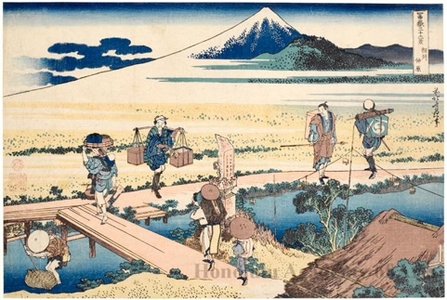
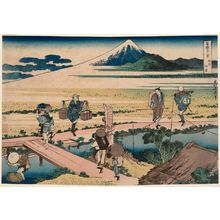
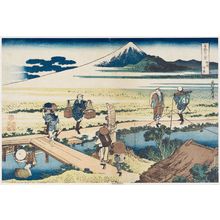
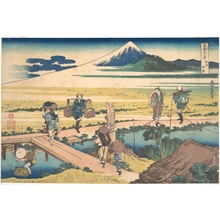
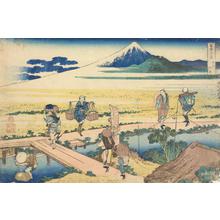
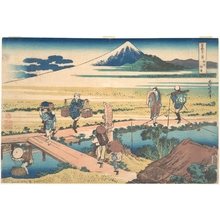
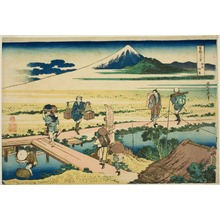
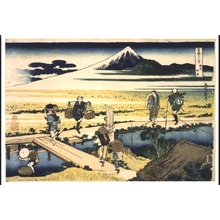
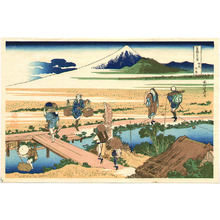
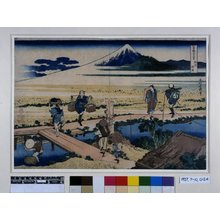
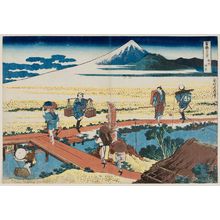
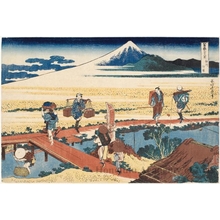
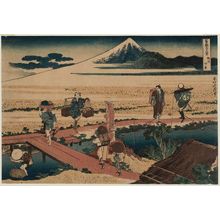
![[Sōshū nakahara] Japanese Print "[Sōshū nakahara]" by Katsushika Hokusai, 葛飾北斎 (Katsushika Hokusai)](https://data.ukiyo-e.org/loc/thumbs/02484v.jpg)